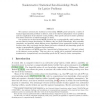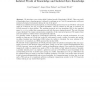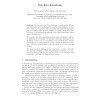60 search results - page 2 / 12 » Zero knowledge with efficient provers |
CRYPTO
2008
Springer
13 years 6 months ago
2008
Springer
We construct noninteractive statistical zero-knowledge (NISZK) proof systems for a variety of standard approximation problems on lattices, such as the shortest independent vectors...
EUROCRYPT
2008
Springer
13 years 6 months ago
2008
Springer
We introduce a new notion called -isolated proofs of knowledge ( -IPoK). These are proofs of knowledge where a cheating prover is allowed to exchange up to bits of communication wi...
SCN
2004
Springer
13 years 10 months ago
2004
Springer
Abstract. We introduce and define the notion of identity-based zeroknowledge, concentrating on the non-interactive setting. In this setting, our notion allows any prover to widely...
FOCS
2003
IEEE
13 years 10 months ago
2003
IEEE
We show how a polynomial-time prover can commit to an arbitrary finite set Ë of strings so that, later on, he can, for any string Ü, reveal with a proof whether Ü ¾ Ë or Ü ...
TCC
2005
Springer
13 years 10 months ago
2005
Springer
Abstract. We introduce Fair Zero-Knowledge, a multi-verifier ZK system where every proof is guaranteed to be “zero-knowledge for all verifiers.” That is, if an honest verifi...



